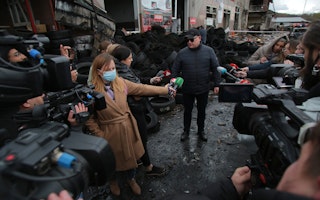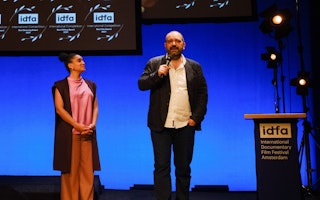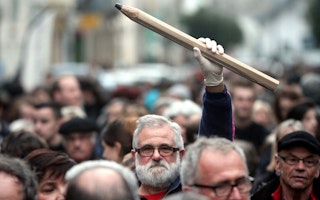Protecting Media Pluralism in Europe: Signs of Progress
By Mark Thompson
In the first instalment of this series on media pluralism, Mark Thompson discussed how media are important—perhaps essential—for democracy and open society to flourish. With that in mind, you would expect the institutions of the European Union (EU) to support media pluralism; and so they do, but not in a straightforward way. In this second article, Thompson reviews a landmark report by the EU’s High Level Group on Media Freedom and Pluralism.
The High-Level Group on Media Freedom and Pluralism (HLG) was set up in October 2011 by Neelie Kroes, European Commissioner for the Digital Agenda. The HLG was charged to provide “recommendations for the respect, the protection, the support and the promotion of pluralism and freedom of the media in Europe.”
The European Commission is the engine-room of the EU, proposing new European laws and overseeing the implementation of EU policy. It has a record of strong reluctance to pursue detailed policy on media pluralism and freedom, so Kroes’s initiative stirred interest and even hope that Brussels was ready for a more pro-active approach to bolster media pluralism.
The HLG did not include anyone with a grounding in the media or indeed in media policy. Perhaps this was a calculated decision. It lowered the risk of repeating conventional wisdom, while it increased the risk of misjudging priorities.
The Group’s report was published on January 21. The first recommendation starts so well that it merits quoting in full:
The EU should be considered competent to act to protect media freedom and pluralism at State level in order to guarantee the substance of the rights granted by the Treaties to EU citizens, in particular the rights of free movement and to representative democracy. The link between media freedom and pluralism and EU democracy, in particular, justifies a more extensive competence of the EU with respect to these fundamental rights than to others enshrined in the Charter of Fundamental Rights.
Neelie Kroes must now flourish this statement like a banner. To date, the major barrier to EU action on media freedom and pluralism has been the Commission’s own doubts as to whether the EU actually has the authority to legislate in this area. The lack of political appetite among national governments, with the power to block new EU legislation, hasn’t helped either. If Commissioner Kroes was searching for confirmation that the EU can indeed step in to protect media freedom, this report does at least that.
The HLG then spells out, with equal trenchancy, the practical sequel to this recommendation: “the EU should designate… a monitoring role of national-level freedom and pluralism of the media” at the EU Agency for Fundamental Rights (FRA). The findings from the FRA would be published and discussed by the European Parliament. The agency is responsible for providing the EU and national governments with advice and research on the state of play of human rights across the EU. Doubts over whether media freedom is something that the EU could actually legislate on have meant that to date the agency has not examined the issue—much to the incredulity and frustration of the European Parliament.
These two recommendations are the report’s high point. Others, however, are also valuable and may prove useful. The importance of “coordination of support and funding for quality journalism” is underlined, as is the need for audio-visual regulators to be independent. The threat posed by preferential state subsidies to favoured media outlets, often in the form of advertising contracts—a trend exposed by the Mapping Digital Media research—is clearly identified: “Any public funding to media organisations should be given on the basis of non-discriminatory, objective and transparent criteria which are made known in advance to all media.”
Much less convincing is the HLG’s proposal that all EU member states should set up “independent media councils” with “real enforcement powers, such as the imposition of fines, orders for printed or broadcast apologies, or removal of journalistic status.” The recommendation goes on to say that “the national media councils should follow a set of European-wide standards and be monitored by the Commission to ensure that they comply with European values.” This hasty idea, presumably meant as an intervention in the current debate about self-regulation, has already rung alarm bells in the British press. Opponents of EU action on media pluralism may easily conjure a vision of Commission officials hungry for authority over “independent” media councils, consequently discrediting the report as a whole.
In their treatment of public service media, the HLG sound faint-hearted. “There should be a provision of state funding for media which are essential for pluralism (including geographical, linguistic, cultural and political pluralism), but are not commercially viable. The state should intervene whenever there is a market failure leading to the under-provision of pluralism, which should be considered as a key public good.” This recommendation envisages public service media as niche operators producing material that is commercially unattractive. The HLG should, on the contrary, have affirmed the need for strong public service media, operating independently across genres and platforms. No wonder the European Broadcasting Union (EBU), the association of public service broadcasters, has praised the report tepidly as “a useful assessment.”
Through no fault of the HLG, another recommendation has a sadly posthumous whiff: “Media freedom and pluralism should play a prominent role in the assessment of accession countries. A free and pluralist media environment must be a pre-condition for EU membership.” Unfortunately that particular horse bolted in 2004 and again in 2007, with the two waves of EU enlargement in central Europe. The Commission needs to make sure that it takes up this issue in earnest for countries in the process of joining the EU. But it also needs a mechanism or legislation to ensure that existing member countries continue to uphold these standards after they have joined. The examples of Italy and Hungary—countries failing to fulfil media pluralism commitments—illustrates that EU oversight of states after they join is inadequate.
The HLG is near silent on several core issues. The report largely ignores media ownership, even though concentration and poor transparency of ownership are problems that need EU-level attention. And it says nothing about the EU’s relationship with the Council of Europe in respect of media, which cries out for creative reform, binding the EU to the media standards developed by the Council of Europe (and endorsed by all its members, including all EU members and aspiring members).
Nor is anything said about the Indicators for Media Pluralism in the Member States, prepared at the Commission’s behest by a team of independent experts and unveiled in 2009, since when they have gathered dust. If the HLG is calling for the EU to monitor media freedom and pluralism, it makes no sense to ignore the Indicators now.
These shortcomings will fade to insignificance, however, if Kroes and others in the Commission can now build on the HLG’s best recommendations, legislate on media freedom, set up a monitoring system, and seriously address the problems around media ownership.
Until September 2015, Mark Thompson was a program officer with the Open Society Program on Independent Journalism.


